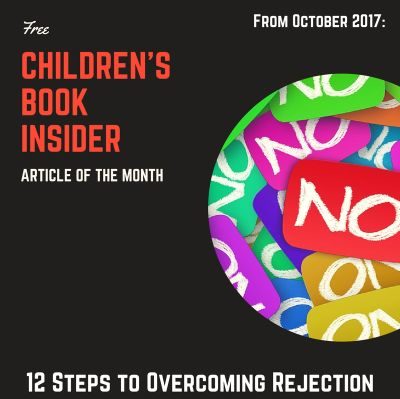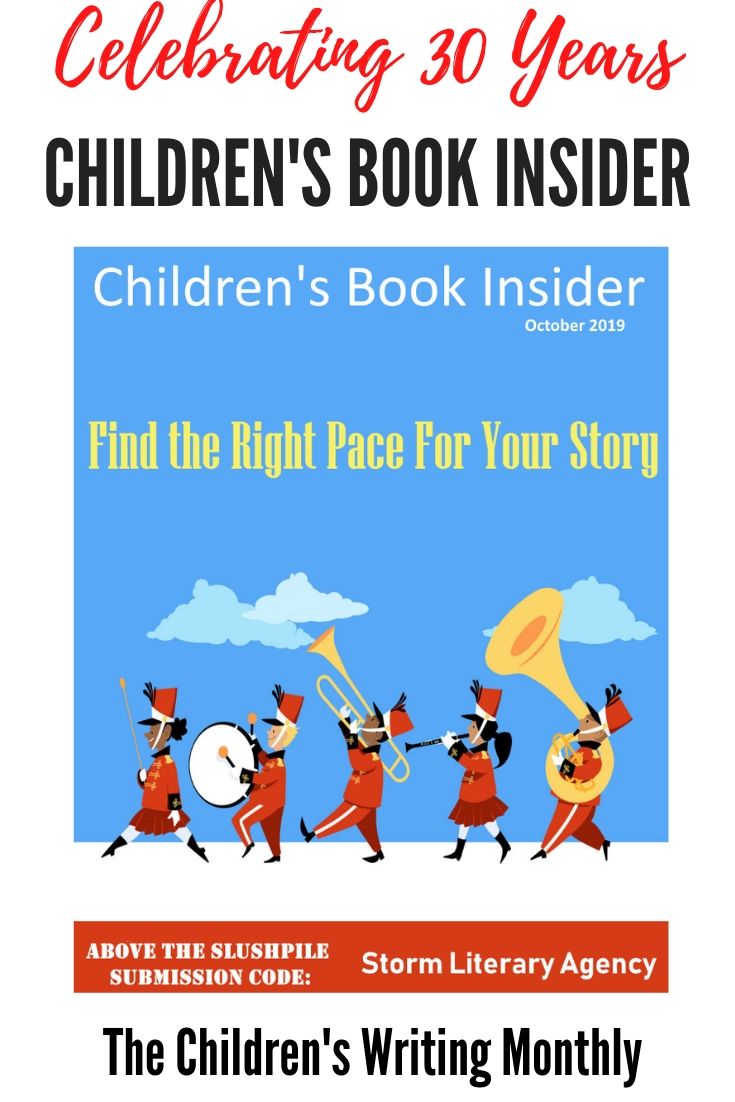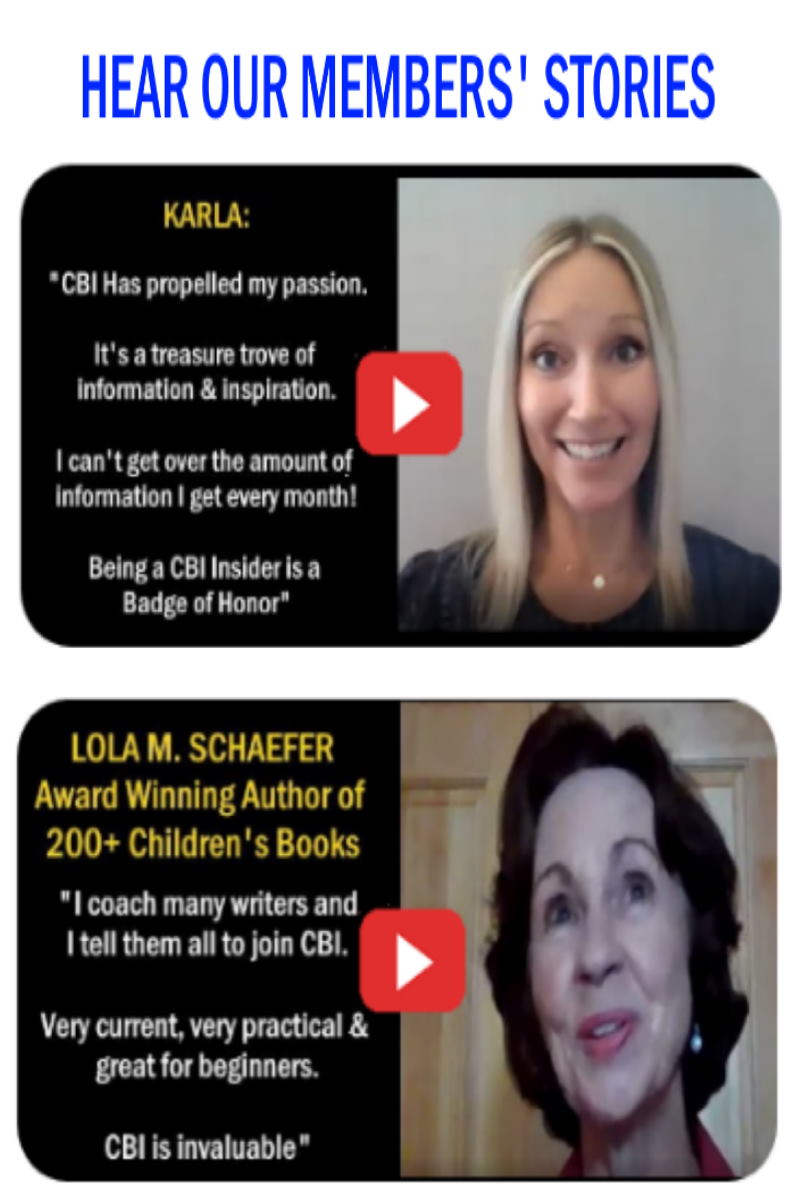
Every month, we’ll share a free article that recently appeared in the pages of Children’s Book Insider, the Children’s Writing Monthly. To learn more about the magazine and get a special offer, go to http://writeforkids.org/come-join-the-insiders-2/
This month, we present a fantastic piece by Jane McBride that will give you the tools to not only overcome rejection, but thrive as a result of it. It’s extremely empowering, and we’re sure you’ll love it.
This article originally appeared in the October, 2017 edition of Children’s Book Insider.

by Jane McBride
Having had a family member go through the 12 step program originated in AA, I have always had the highest esteem for this inspired program and have witnessed the miracles it can work.
With many rejections under my belt, including one scathing one where an editor suggested I find a different career path, I have looked for ways to deal with the sometimes crippling effects of rejection. I came up with my own 12 step program for writers who are dealing with their work having been rejected by agents or editors:
1. Admit to ourselves we do not have control over rejection.
2. Come to believe that we can take back some control by working to improve our writing.
3. Make a decision to do the work necessary to improve.
4. Make a searching inventory of our strengths and weaknesses in writing.
5. Admit to ourselves the exact nature of where we went wrong in a particular project.
6. Are ready to work to improve our writing in any way we can.
7. Humbly accept that our writing needs improvement.
8. Make a list of all the ways we could improve.
9. Make plans to address our weaknesses, as in taking a workshop, attending a conference, seeking out a critique partner, etc.
10. Continue to take inventory of our strengths and weaknesses in writing.
11. Seek to improve our writing skill by continuing to write, take classes, and other means.
12. Try to help other writers whenever we can.
Let’s take these steps one at a time and see how we can apply them to dealing with rejections.
Step 1: Admit to ourselves that we do not have control over rejection. I own up to the fact that I am a bit of a control freak. I want to know that if I do A, then B will happen. In the case of my writing, I want to know that if I write the best book of which I am capable (A), the book will sell (B). The fact is, these two do not always go together. I’ve sold thirty-six books over the course of my writing career of, coincidentally, thirty-six years. However, I have written many more books than thirty-six, books which did not sell. No matter how hard I tried to make these books as good as possible, they failed to sell. Much of that was my fault in that I didn’t possess the talent or skill early in my career to write a publishable book. Some of the reasons the books didn’t sell were changing market condition and change of editors. Though I do have control over developing my talent and skill, I didn’t possess those at that time.
Step 2. Come to believe that we can take back some control by working to improve our writing. As stated above, I didn’t possess the skill to write salable books at the beginning of my writing, but I knew that I could learn.
Step 3. Make a decision to do the work necessary to improve. I resolved that I would develop my story- telling and writing talents. This took years, but I persevered. Though I have given up on other self-improvement goals, I knew I could not give up on this one. Writing was and is too important.
Step 4. Make a searching inventory of our strengths and weaknesses in writing. I have been told by editors and readers that I have a talent for writing dialogue and developing characters. Similarly, I have been told, mostly in rejection letters, that I lack plotting talents. (Even after all these years, I still lack these, but I’m getting better.) I determined that I would showcase my strengths, i.e. dialogue and characterization, and learn to make my plotting better.
Step 5. Admit to ourselves the exact nature of where we went wrong on a particular project. In one very ambitious project, a 100,000 word suspense novel, I finally had to admit that I had not thought the story all the way through and that the plot inconsistencies were too many to overcome. In addition, I was trying to balance too many points-of-view.
Step 6. Are ready to improve our writing in every way we can. I joke with writer friends that what I lack in talent, I make up for in sheer stubbornness. I refused to give up writing, even when the rejections came so quickly that I could hardly keep them straight. I have watched friends who were talented drop out of writing, unable to keep up the commitment and dedication necessary to succeed.
Step 7. Humbly accept that our writing needs improvement. This is a hard one. Admitting and accepting that our writing is not perfect requires maturity and humility. The editor whom I referenced at the beginning of this article was right to reject the book I submitted to her. (I still think she could have done it more kindly, but she was right: the book was terrible.) Accepting that took me a long time, a period where I sulked and pouted instead of working on improving my writing.
Step 8. Make a list of all the ways we could improve. I mentioned my difficulties in plotting. I continually struggle to strengthen my plotting techniques. I also have a problem of using the same word over and over again. I have a list of my “pet” words, words I try to avoid using very often, and yet they still find their way into my writing.
Step 9. Make plans to address our weakness by taking a workshop, attending writers’ conferences, seeking a critique partner, etc. Over the years I have attended many workshops and conferences. I belong to a writers’ group where I am fortunate enough to have a wonderful critique partner. In short, I am doing every thing I can to make my writing better.
Step 10. Continue to take inventory of our strengths and weaknesses in writing. Improvement is not a destination. It is a continuing journey. Understand that if you want to succeed, you must always be striving.
Step 11. Seek to improve our writing skill by writing, taking classes, and others. One long-time writer friend once asked me why I continued to attend workshops and conferences when I was already multi-published. I replied that I hoped I would never stop learning or wanting to learn. When we do that, we stagnate and our writing reflects it.
Step 12. Try to help others whenever we can. Most writers are incredibly generous with their talents. I have had many successful writers offer encouragement and help to me along the way. In turn I try to pass this along by helping others, mentoring a young writer in middle school, appearing at school classes which are studying writing, critiquing those who ask for feedback. In helping others, I am not only passing along the good which was done for me but also strengthening my own skills by teaching and mentoring.
Whatever level you are at in your writing career at the moment, I hope you will find at least a few of these steps helpful. For real writers, writing is not just what we do, it is who we are. We need to arm ourselves for the inevitable rejections and hardships that a career in writing entails.

✏ Word Counts & Age Groups for Every Kidlit Category
✏ FAQs, Glossaries and Reading Lists
✏ Category-specific Tips, from Picture Books Through Young Adult Novels
✏ 5 Easy Ways to Improve Your Manuscript
✏ Writing For Magazines …and more!
This is a gift from the editors of Children’s Book Insider, and there’s no cost or obligation of any kind.
We will never spam you or share your personal information with anyone. Promise!






Thanks for the article. it is very helpful in motivating me to pursue my dreams in writing till I finally publish my first book.